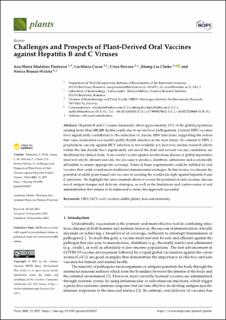Challenges and prospects of plant-derived oral vaccines against hepatitis b and c viruses
Pantazica, Ana-Maria Madalina; Cucos, Lia-Maria; Stavaru, Crina; Clarke, Jihong Liu; Branza-Nichita, Norica
Peer reviewed, Journal article
Published version
Permanent lenke
https://hdl.handle.net/11250/2827793Utgivelsesdato
2021-09-28Metadata
Vis full innførselSamlinger
Sammendrag
Hepatitis B and C viruses chronically affect approximately 3.5% of the global population, causing more than 800,000 deaths yearly due to severe liver pathogenesis. Current HBV vaccines have significantly contributed to the reduction of chronic HBV infections, supporting the notion that virus eradication is a feasible public health objective in the near future. In contrast to HBV, a prophylactic vaccine against HCV infection is not available yet; however, intense research efforts within the last decade have significantly advanced the field and several vaccine candidates are shortlisted for clinical trials. A successful vaccine against an infectious disease of global importance must not only be efficient and safe, but also easy to produce, distribute, administer, and economically affordable to ensure appropriate coverage. Some of these requirements could be fulfilled by oral vaccines that could complement traditional immunization strategies. In this review, we discuss the potential of edible plant-based oral vaccines in assisting the worldwide fight against hepatitis B and C infections. We highlight the latest research efforts to reveal the potential of oral vaccines, discuss novel antigen designs and delivery strategies, as well as the limitations and controversies of oral administration that remain to be addressed to make this approach successful.

